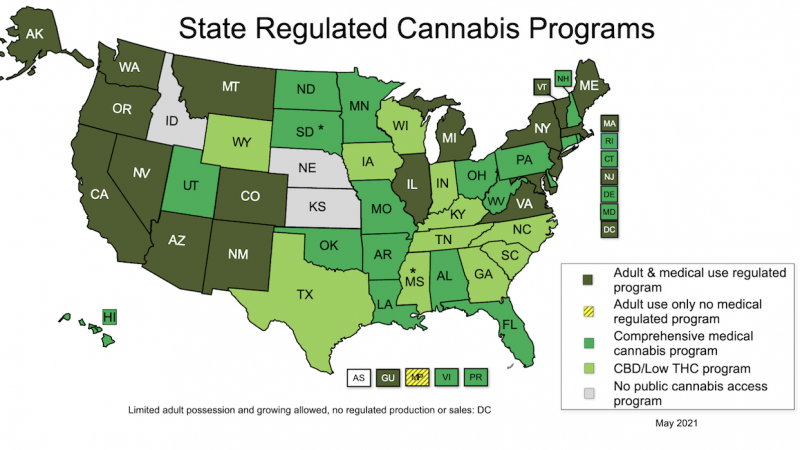Five Things You Need To Know About Alabama’s New Medical Marijuana Law
Last month, Gov. Kay Ivey signed Alabama’s first-ever medical marijuana law. The 100-page document can be a little daunting, so we read through it and pulled out the highlights.
1. What Will The Law Do, And How Do You Get Approved?
The law legalizes medical marijuana for adults and minors with certain conditions under a doctor’s recommendation. To get legally approved to use the drug, you have to visit a doctor who has a current license to practice medicine in Alabama and has passed an exam on medical marijuana. That doctor has to verify that you have a qualifying medical condition and determine that conventional medical treatment or therapy has failed to help your symptoms. The qualifying medical conditions include:
- Autism spectrum disorder
- Panic disorder
- Depression
- Post-traumatic stress disorder
- Crohn’s disease
- Tourette’s syndrome
- Parkinson’s disease
- Sickle cell anemia
- Epilepsy or a condition causing seizures
- A terminal illness
- HIV/AIDS-related nausea or weight loss
- Cancer-related cachexia, nausea or vomiting, weight loss, or chronic pain
- Spasticity associated with a motion neuron disease, including amyotrophic lateral sclerosis (ALS or Lou Gehrig’s disease)
- Spasticity associated with multiple sclerosis or a spinal cord injury
- Persistent nausea that is not significantly responsive to traditional treatment. Exceptions include: nausea related to pregnancy, cannabis-induced cyclical vomiting syndrome or cannabinoid hyperemesis syndrome
- A condition causing chronic or intractable pain in which conventional therapeutic intervention and opiate therapy isn’t advised or has proved ineffective
With a doctor’s recommendation and proof of an Alabama residency, you can pay to apply for a medical marijuana card. The fee won’t exceed $65. If you’re approved, the Alabama Medical Cannabis Commission will enter your information into the statewide cannabis patient registry system. That’s when you can start buying the prescriptive amount from a licensed dispensary.
But what about minors? Anyone under 19 years old has to go through the same process. They also need a designated caregiver who is authorized to buy and administer the drug. Both the caregiver and the minor have to be a resident of Alabama and be registered with the state cannabis commission.
2. What Will The Law NOT Do?
It doesn’t legalize medical marijuana for everyone. Say, for example, you have symptoms like chronic back pain, endometriosis or an eating disorder. According to the law, those conditions aren’t covered — as of now.
Roughly 30 states like Oregon, California and Colorado have legalized medical marijuana, and it eventually led to legal recreational use in some of those places. But Alabama’s bill says that’s not going to happen. It emphasizes that “recreational use of marijuana remains a significant threat to public health and safety.” As a result, lawmakers instituted a pretty hefty punishment for violating the law.
You could face up to a Class B felony if you possess, distribute, manufacture or use medical marijuana without a license. That includes if you’re given the drug by a registered patient, caregiver or dispensary.
You could also face jail time if you possess more than 70 daily doses, even with a medical marijuana license.
3. What’s The Highest Dosage Available, And Can I Get It In A Gummy?
As of now, doctors can prescribe the drug for up to 12 months at a time. It will be up to the state cannabis commission to eventually decide how long a prescription can last before being renewed.
In most cases, the daily dosage can’t exceed 50 milligrams of THC (the compound that gets you high). The daily dosage can later be bumped up to 75 milligrams if the doctor determines it’s “medically appropriate” or if a patient is diagnosed as terminally ill. If the dosage exceeds 75 milligrams, the patient’s driver’s license will be suspended.
Medical marijuana is allowed in the forms of:
- Oral tablet, capsule or tincture
- Non-sugarcoated gelatinous cube, cuboid or lozenge
- Gel, oil, cream or other topical preparation
- Transdermal patch
- Nebulizer
- Liquid or oil only for an inhaler
- Suppository
That means the drug cannot be smoked, vaped, covered in sugar, put into food or sold as a raw plant. The state cannabis commission will also establish “one universal flavor” for the jelly cubes and lozenges.
4. What Does This Mean For The Workplace?
Under the new law, employers have a lot of discretion and protection. They don’t have to allow or accommodate the use of medical marijuana. In fact, they can refuse to hire or let someone go even if that person uses the drug legally. Employers are also at liberty to create a drug-testing policy against medical marijuana or require employees to notify them if they start legally using the drug.
Finally, employers aren’t required to help pay for the drug through medical insurance plans or reimbursements, and they have the right to deny workers compensation for someone who fails a drug test or refuses to take one.
This leaves little legal defense for employees. For example, you can’t sue your employer if they don’t allow medical marijuana or if you lose your job, are disciplined or discharged because you use the drug legally. If you are fired for failing a drug test or refusing to take a drug test, you’ll legally be considered as having been “discharged” from the job because of misconduct. That means it could be more difficult for you to collect unemployment compensation and benefits, according to the Alabama Unemployment Compensation Handbook.
5. What’s The Timeline? How Soon Can I Buy Medical Marijuana?
That’s a tricky one. The timeline for when you can start buying the drug could be a year or more. First, the state has to start implementing the new law and setting up new bureaucracies.
Members of the Alabama Medical Cannabis Commission have to be appointed by July 1, 2021. A number of state officials, including the governor, state health officer and agriculture commissioner, get to name the 14 members of the board. Those commission members must be confirmed by the state senate in the next special or regular legislative session. Currently, that would be February 2022, though there’s political talk about a special session this summer or fall.
Next, the State Board of Medical Examiners will be required to adopt requirements by Dec. 1, 2021, that explain what boxes doctors must check off before issuing a recommendation. According to the law, this includes things like what should go in the patient’s medical record and any review of the patient’s controlled drug prescription history in the state’s database.
The state cannabis commission has until Sept. 1, 2022, to create a system that allows people to apply for licenses to produce, transport and sell the drug. The commission will also be tasked with establishing standards like how the drug should be packaged and labeled; chain of custody requirements; and how the drug can be advertised and marketed by dispensaries.
Before the drug is available for purchase, the Alabama Medical Cannabis Patient Registry System has to be created. That will electronically track physician certifications, patient names, daily dosage recommendations, and all medical marijuana purchases by a patient. Also, the commission will have to accept bids for the statewide seed-to-sale tracking system, which tracks all inventory and transactions across the state.
So, long story short: It could be September 2022 before eligible patients can start applying for a medical marijuana card.
FBI: DNA from glove near Guthrie home appears to match glove worn by suspect
The FBI says a glove containing DNA was found about two miles from Nancy Guthrie's Arizona home and appears to match those worn by a masked person outside her front door the night she vanished.
Trump’s border czar says a ‘small’ security force will stay in Minnesota
Tom Homan says this federal force will stay "for a short period of time" to protect immigration agents who remain as the sweeping crackdown draws down.
At least 6,000 killed over 3 days during RSF attack on Sudan’s el-Fasher, UN says
More than 6,000 people were killed in over three days when a Sudanese paramilitary group unleashed "a wave of intense violence" in Sudan's Darfur region in late October, according to the UN.
Photos: The flying doctors of Lesotho won’t let their wings be clipped
This band of airborne health workers bring essential medical care to isolated communities in the southern African nation. In addition to turbulence, they face a new obstacle: budget cuts.
U.S. Alpine skier Mikaela Shiffrin finishes another Olympic race without a medal
U.S. Alpine skier Mikaela Shiffrin looks unstoppable everywhere except the Olympics. She's running out of chances to medal at the Milan Cortina Games.
‘Major travel impacts’ expected as winter storm watch issued for northern California
As people travel for the holiday weekend, much of Northern California is under a winter storm watch, with communities bracing for several feet of snow.








